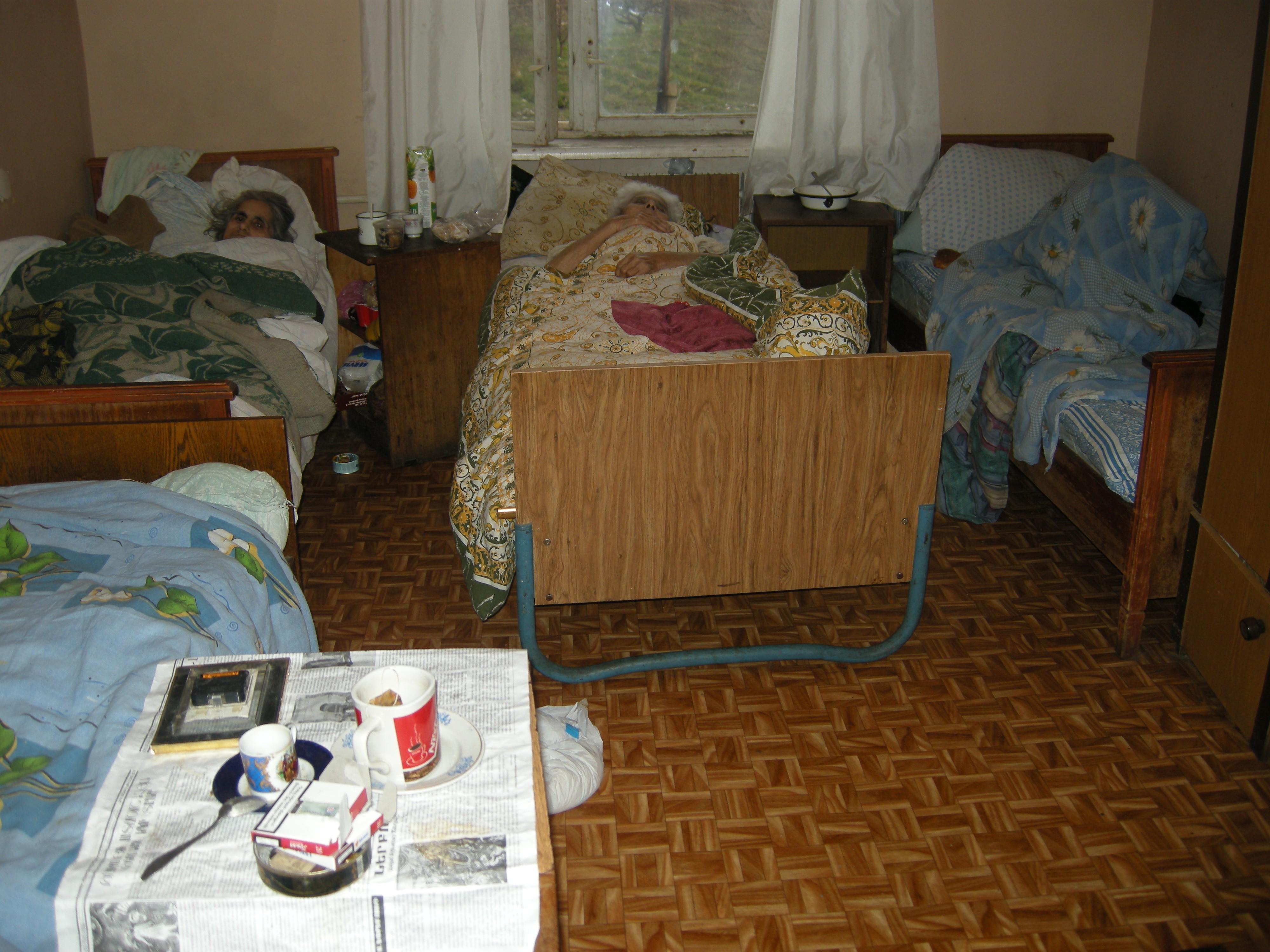
Old-Age with Dignity: A Visit to the Hagktanak Home for Seniors
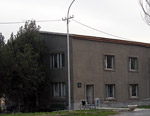 Where the food isn’t great and ants come and go as guests You can get to the old age home located just over the border of Yerevan, in the village of Haghtanak, by taking the #56 mashkrutka (minivan). After alighting, you still have to walk about the distance of two bus stops to get to the home. Sitting on a piece of land that is fenced in with an old guard house, the place resembles a military camp, even though you can freely walk inside.
Where the food isn’t great and ants come and go as guests You can get to the old age home located just over the border of Yerevan, in the village of Haghtanak, by taking the #56 mashkrutka (minivan). After alighting, you still have to walk about the distance of two bus stops to get to the home. Sitting on a piece of land that is fenced in with an old guard house, the place resembles a military camp, even though you can freely walk inside.
- Hello, do you live here? - Yes, in the home for people without families. - Excuse me…Where did you say? - In the home for people without families. What else is this place? To check on whether the person was a resident of the home or not, I approached him sitting in the hall. I wanted to strike up a conversation. He told me two reasons why he calls the old-age home a place for abandoned folk. First, he was brought here by his children and second, no one apparently supervises the residents. Potato soup and porridge; great huh? “They give us some potato soup to eat, maybe some rice. What’s so good about that? They give us some porridge which I don’t like. It doesn’t even have any milk in it. They use water. If you don’t eat what they give you’ll go hungry,” said the elderly man, Grandpa Razmik. Other residents also were dissatisfied with the food. Grandpa Arsen and his wife prepare their meals on an electric heater in their room. “They told us that we had to eat our meals in the dining room, but we said that we’d take what they give us back to our room, fry up a bit of onions in oil and they eat their meals,” Grandpa Arsen said. “Just don’t write anything bad. They’ll throw us out if you do,” he said and began to praise the place for being so clean. “The attendants clean once a week. They wash our clothes and we have a shower. You’re welcome to us it,” Arsen added. Another elderly resident whispered in my ear, “Oh yeah, things are great if you don’t mind the lice.” Residents say they have gotten used to the rooms. Two of the six annexes have been renovated. Grandma Olya has hung curtains in her room. “We have to spruce up everything. The curtains they had hung were useless.” Hospital ward for the bedridden smells awful Elderly patients who are bedridden and in need of special care are housed in another building. Residents call that annex the ‘hospital’. “Where are you going?” asked one of the elderly residents when he saw that I was being escorted to the ‘hospital’ by Deputy Director Artur Markosyan. “You’ll suffocate if you go in there.” 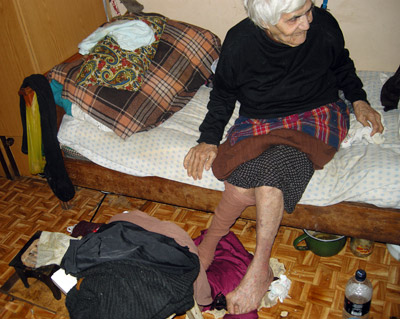 On the outside, the two story building looks well maintained, but when you put your foot in the door you get the feeling that you have entered a ‘danger zone’. You immediately feel nauseous. The indescribable odor of the place simply overpowers your senses. There are about 50 residents housed in the hospital ward. Caretaker Anahit told me that those patients on death’s door are transferred here. Some of the patients are even unconscious. We heard loud voices emanating from some of the rooms. One patient was complaining that he wasn’t getting his pension and other was lamenting his tragic fate but at the same time complaining that no one was listening. They called him ‘mad’. On the small chest of drawers a mob of ants had covered a piece of cake place there just minutes ago. “Don’t worry it’s clean,” said Mrs. Anna, the room’s resident, as she pushed the ants away. “All this is cleaned up.” “Come here young girl. Place this dish rag over the plates so that the ants don’t get in,” said Mrs. Azniv, who was lying down on the other bed.
On the outside, the two story building looks well maintained, but when you put your foot in the door you get the feeling that you have entered a ‘danger zone’. You immediately feel nauseous. The indescribable odor of the place simply overpowers your senses. There are about 50 residents housed in the hospital ward. Caretaker Anahit told me that those patients on death’s door are transferred here. Some of the patients are even unconscious. We heard loud voices emanating from some of the rooms. One patient was complaining that he wasn’t getting his pension and other was lamenting his tragic fate but at the same time complaining that no one was listening. They called him ‘mad’. On the small chest of drawers a mob of ants had covered a piece of cake place there just minutes ago. “Don’t worry it’s clean,” said Mrs. Anna, the room’s resident, as she pushed the ants away. “All this is cleaned up.” “Come here young girl. Place this dish rag over the plates so that the ants don’t get in,” said Mrs. Azniv, who was lying down on the other bed. 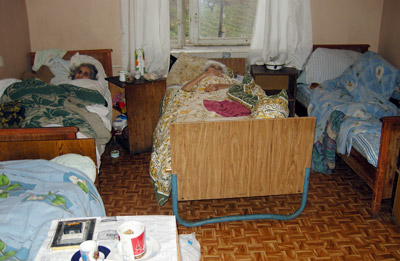 There are 4-5 beds placed in rooms measuring 20 square meters. There is no room to breathe. During our first visit to the home in the winter, caretaker had opened the window to let in some fresh air. The cold outside air swept into the room and swept away the pent-up mustiness. It also blew directly on the head of the old sick woman. Grandma Emma awoke from the cold blast of sir. A supper of buckwheat and tea; no sugar A bit later, the staff started to serve diner – two spoonfuls of buckwheat on a metal plate. “Not gruel again?” protested Mrs. Anna, “At least they should serve some yoghurt on the side.” One of the residents removed some bread from a bag. Rounding out supper that night was a cup of tea; no sugar. Mrs. Anna says her pension is 21,000 AMD. “But they keep 8,000 for meals and other things. I buy coffee and sugar. I get headaches so I also buy medicine. I have 200 AMD to my name right now. I get the pension on the second of the month. What kind of money is that? If you what something a little special, you just can’t afford it.” From underneath the clothes strewn about at the foot of the opposite bed, a cat appeared, yawning. “It’s our pussycat,” said one of the women. Two other cats appeared in quick succession. The caretaker said that the cats approach those residents who are not long for this world. She added that the common adage is that cats can transfer the sicknesses of humans onto themselves.
There are 4-5 beds placed in rooms measuring 20 square meters. There is no room to breathe. During our first visit to the home in the winter, caretaker had opened the window to let in some fresh air. The cold outside air swept into the room and swept away the pent-up mustiness. It also blew directly on the head of the old sick woman. Grandma Emma awoke from the cold blast of sir. A supper of buckwheat and tea; no sugar A bit later, the staff started to serve diner – two spoonfuls of buckwheat on a metal plate. “Not gruel again?” protested Mrs. Anna, “At least they should serve some yoghurt on the side.” One of the residents removed some bread from a bag. Rounding out supper that night was a cup of tea; no sugar. Mrs. Anna says her pension is 21,000 AMD. “But they keep 8,000 for meals and other things. I buy coffee and sugar. I get headaches so I also buy medicine. I have 200 AMD to my name right now. I get the pension on the second of the month. What kind of money is that? If you what something a little special, you just can’t afford it.” From underneath the clothes strewn about at the foot of the opposite bed, a cat appeared, yawning. “It’s our pussycat,” said one of the women. Two other cats appeared in quick succession. The caretaker said that the cats approach those residents who are not long for this world. She added that the common adage is that cats can transfer the sicknesses of humans onto themselves. 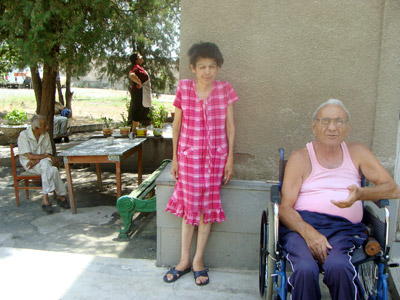 75 year-old Grandpa Hamlet has been in the special care ward for the past eleven years. He described the care given by the attendants as top-notch. Hamlet pointed out that they change your under garments, wash you, cut your nails, do your wash, and all for a mere 40,000 AMD salary. “We have a problem filling staff vacancies” Deputy Director Markosyan said they had problems filling staff vacancies at the home. Some posts haven’t been filled for months. “What’s most tragic is that medicines are scarce. The government doesn’t fulfill our needs and the same holds true for the food we serve,” said Grandpa Hamlet. He says the medicines are out of date. “They remain on the shelves and lose their potency. Residents are forced to buy their own with their pension money. “I have to buy all the basic medicines I need to live normally. The government doesn’t care.” Another employee said, “The residents buy medicines and think they can just get by with using a little. After they die, we go through their cabinet and pull out more drugs that we have in our own stockroom.” Vardishagh Yeghiazaryan is responsible for managing these two floors of the old age home. There are two shifts of care takers around the clock. They say they wash the residents’ clothes, change the sheets and bathe the elderly but the odor never goes away.
75 year-old Grandpa Hamlet has been in the special care ward for the past eleven years. He described the care given by the attendants as top-notch. Hamlet pointed out that they change your under garments, wash you, cut your nails, do your wash, and all for a mere 40,000 AMD salary. “We have a problem filling staff vacancies” Deputy Director Markosyan said they had problems filling staff vacancies at the home. Some posts haven’t been filled for months. “What’s most tragic is that medicines are scarce. The government doesn’t fulfill our needs and the same holds true for the food we serve,” said Grandpa Hamlet. He says the medicines are out of date. “They remain on the shelves and lose their potency. Residents are forced to buy their own with their pension money. “I have to buy all the basic medicines I need to live normally. The government doesn’t care.” Another employee said, “The residents buy medicines and think they can just get by with using a little. After they die, we go through their cabinet and pull out more drugs that we have in our own stockroom.” Vardishagh Yeghiazaryan is responsible for managing these two floors of the old age home. There are two shifts of care takers around the clock. They say they wash the residents’ clothes, change the sheets and bathe the elderly but the odor never goes away. 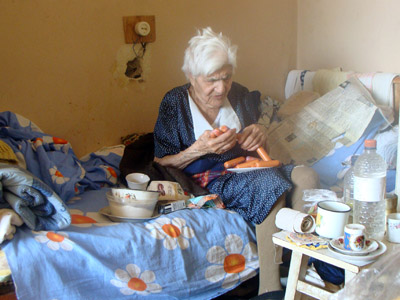 “They take care of them like they were small children,” says Vardishagh. There are eight care takers in all; two to a floor. He says that the residents’ under garments are changed three times a day and that they are bathes once a week. He assured us that management pays great attention to every little matter. Residents impatiently await new director When he last visited the old age home on July 27, a flurry of activity greeted us. Repairs were in full swing and the hospital ward was being cleaned. The smell had dropped substantially. Residents credited the work to the new director, Armen Gyurdjyan, who was replacing Davit Shahbazyan as of August 1. I asked if the cleaning work had been ordered by the new director. Vardishagh Yeghiazaryan responded that he had ordered the work to commence. One of the residents boasted that they now had light in the courtyard. Shahbazyan has tendered his resignation at the home to go work at the Ministry of the Diaspora. We learnt from Hasmik Khachatryan, who heads the Public Affairs Department at the Ministry of Social Affairs, that the resignation papers hadn’t yet been approved and a new director appointed. But residents at the home regarded the change as a done deal. They seemed already satisfied with the new director. As to would be acting director in the interim wasn’t yet clear. “The current one comes from Tsarukyan’s Prosperous Armenian Party. He said that as of August 1 we could get whatever we wanted to eat at the dining room,” exclaimed Grandpa Arsen. The women attendants proudly displayed the new uniforms they had received. The hospital also had received a shipment of new mattresses.
“They take care of them like they were small children,” says Vardishagh. There are eight care takers in all; two to a floor. He says that the residents’ under garments are changed three times a day and that they are bathes once a week. He assured us that management pays great attention to every little matter. Residents impatiently await new director When he last visited the old age home on July 27, a flurry of activity greeted us. Repairs were in full swing and the hospital ward was being cleaned. The smell had dropped substantially. Residents credited the work to the new director, Armen Gyurdjyan, who was replacing Davit Shahbazyan as of August 1. I asked if the cleaning work had been ordered by the new director. Vardishagh Yeghiazaryan responded that he had ordered the work to commence. One of the residents boasted that they now had light in the courtyard. Shahbazyan has tendered his resignation at the home to go work at the Ministry of the Diaspora. We learnt from Hasmik Khachatryan, who heads the Public Affairs Department at the Ministry of Social Affairs, that the resignation papers hadn’t yet been approved and a new director appointed. But residents at the home regarded the change as a done deal. They seemed already satisfied with the new director. As to would be acting director in the interim wasn’t yet clear. “The current one comes from Tsarukyan’s Prosperous Armenian Party. He said that as of August 1 we could get whatever we wanted to eat at the dining room,” exclaimed Grandpa Arsen. The women attendants proudly displayed the new uniforms they had received. The hospital also had received a shipment of new mattresses. 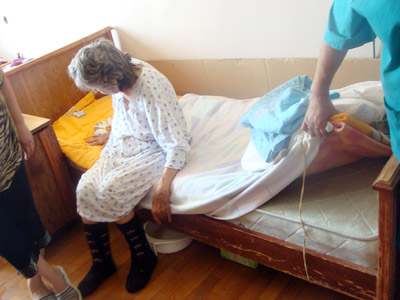 Meanwhile, according to Deputy Director Markosyan, the changes aren’t linked to the new director. They had been planned all along and it’s just coincidence that they are happening at this time. Ministry runs 4 such homes for the elderly and disabled The Ministry of Labor and Social Affairs runs four homes for the elderly on their own and for the disabled (Nork in Yerevan, Haghtanak Village #1 and in Gyumri) and one home for those with neurological/psychological afflictions. There are a total of 1,010 residents being taken care of at these institutions.
Meanwhile, according to Deputy Director Markosyan, the changes aren’t linked to the new director. They had been planned all along and it’s just coincidence that they are happening at this time. Ministry runs 4 such homes for the elderly and disabled The Ministry of Labor and Social Affairs runs four homes for the elderly on their own and for the disabled (Nork in Yerevan, Haghtanak Village #1 and in Gyumri) and one home for those with neurological/psychological afflictions. There are a total of 1,010 residents being taken care of at these institutions. 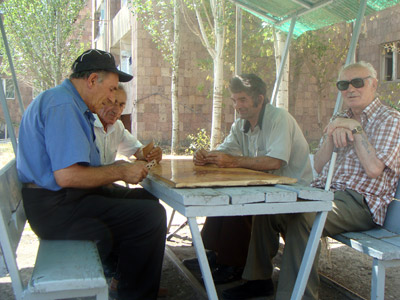 According to the Ministry’s website, the average daily cost for caring for one resident is 2,900 AMD, of which 1,200 goes for meals. Deputy Director Markosyan later confided to us that meals amounted to 1,162 daily. The home keeps 8,000 AMD of residents’ pensions for meal expenses and the rest is spent on medicines, special foods and other sundries. Mr. Markosyan said that residents eat the same things as people in their own homes. “They have an egg, porridge, tea, butter, sugar and sausage for breakfast; for lunch, some soup, salad and fruit; and for supper, some sort of pilaf, tea, cheese and desert.” He added that the government allocates about 50 AMD per day, per resident, for medicines. Deputy Director Markosyan agreed that the hospital ward had a terrible smell to it, pointing out that a majority of the 50 patients there soiled their own clothes. “They built the place with a ventilation system. The building has been there for ten years now and the smell has permeated the walls despite all the cleaning we do,” he said. Better conditions are promised Mr. Markosyan pointed out that two major renovations projects are planned for and that they are waiting for the Social Investment Fund to come up with some cost estimates. Two of the six annexes have been renovated with the financial assistance of the All Armenia Fund and the Social Investment Fund. Since 1989, the place had gone without central heating until 2009. They have used electric heaters in the rooms housing residents. In November, 2009, employees at Viva Cell chipped in and repaired and furnished he main hallway, throwing in a TV to boot. Mr. Markosyan says they’d be better off if an entirely new home was built, arguing that it’s impossible to try and renovate what stands now. We wrote to the Ministry asking how the renovations were being monitored. We have yet to hear back from them. P.S. The names of the residents at the home have been changed.
According to the Ministry’s website, the average daily cost for caring for one resident is 2,900 AMD, of which 1,200 goes for meals. Deputy Director Markosyan later confided to us that meals amounted to 1,162 daily. The home keeps 8,000 AMD of residents’ pensions for meal expenses and the rest is spent on medicines, special foods and other sundries. Mr. Markosyan said that residents eat the same things as people in their own homes. “They have an egg, porridge, tea, butter, sugar and sausage for breakfast; for lunch, some soup, salad and fruit; and for supper, some sort of pilaf, tea, cheese and desert.” He added that the government allocates about 50 AMD per day, per resident, for medicines. Deputy Director Markosyan agreed that the hospital ward had a terrible smell to it, pointing out that a majority of the 50 patients there soiled their own clothes. “They built the place with a ventilation system. The building has been there for ten years now and the smell has permeated the walls despite all the cleaning we do,” he said. Better conditions are promised Mr. Markosyan pointed out that two major renovations projects are planned for and that they are waiting for the Social Investment Fund to come up with some cost estimates. Two of the six annexes have been renovated with the financial assistance of the All Armenia Fund and the Social Investment Fund. Since 1989, the place had gone without central heating until 2009. They have used electric heaters in the rooms housing residents. In November, 2009, employees at Viva Cell chipped in and repaired and furnished he main hallway, throwing in a TV to boot. Mr. Markosyan says they’d be better off if an entirely new home was built, arguing that it’s impossible to try and renovate what stands now. We wrote to the Ministry asking how the renovations were being monitored. We have yet to hear back from them. P.S. The names of the residents at the home have been changed.
 Videos
Videos Photos
Photos




Write a comment